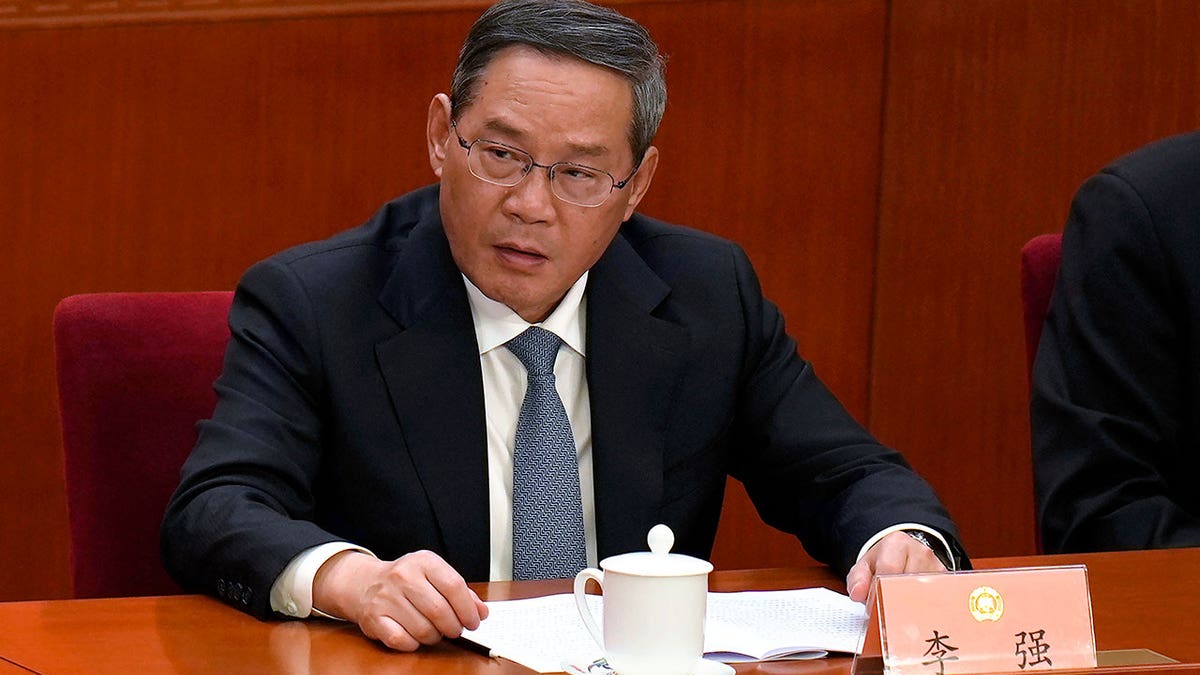Gov. Kristi Noem: Biden is borrowing from China to buy votes
South Dakota Gov. Kristi Noem joins 'Fox & Friends' to discuss President Biden's latest moves to cancel $1.2 billion in student debt and to consider executive action on the border.
- China's government announced the elimination of Premier Li Qiang's annual news conference, a tradition since 1993.
- The National People's Congress, opening Tuesday, will focus on measures to boost the economy, with Li expected to present the government's economic growth target for 2024.
- China remains open to foreign business and investment despite recent changes to national security laws.
China's government said Monday it is eliminating an annual news conference by the premier that was one of the rare times a top Chinese leader took questions from journalists.
Lou Qinjian, the spokesperson for the National People's Congress, said on the eve of the opening of the legislature's annual session that Premier Li Qiang would not hold a news conference at its conclusion, as it has every year since 1993.
The move appears to be in line with a diminishing of the premier’s power, and that of the government bureaucracy generally, as the Communist Party and leader Xi Jinping centralize control of the nation’s affairs, said Alfred Wu, an associate professor at the National University of Singapore.
CHINA'S BELT AND ROAD INITIATIVE PLAGUED BY CORRUPTION AND POLITICAL BACKLASH: REPORT
"Because the structure now is the party leads, the premier is more like an implementer of the party’s orders, so no longer so important," he said. "That’s the main message."

Chinese Premier Li Qiang attends the opening session of the Chinese People's Political Consultative Conference held on March 4, 2024, at the Great Hall of the People in Beijing. The Chinese government says it is eliminating an annual news conference by the premier that was one of the few times a top Chinese leader took questions from the news media. (AP Photo/Ng Han Guan)
The weeklong meeting of the largely ceremonial congress, which opens Tuesday, is being closely watched for any indications of what steps the government will take to boost the struggling economy. Li will present an annual report at the opening that is expected to include the government’s economic growth target for 2024.
On Monday, state leaders including Xi and Li attended the opening session of a parallel advisory body, the Chinese People’s Political Consultative Conference, in the cavernous, red-carpeted chamber of the Great Hall of the People on one side of Beijing's Tiananmen Square.
Lou said that journalists would be given more opportunities to ask questions of government ministers and other officials, as well as of the nearly 3,000 delegates to the congress. The last time there was no premier's press conference after the congress was in 1992, state broadcaster CCTV said.
"If there are no special circumstances, the premier’s press conference will not be held in the following years of this National People's Congress," he said, referring to its current five-year term that ends in 2027.
Lou, speaking on a range of issues, insisted that China remains open to foreign business and investment, rejecting concerns that have been raised about recent changes to the national security laws. He also expressed confidence that the nation could overcome any restrictions placed on its access to technology.
The spokesperson reiterated government reassurances that revisions to the espionage law are not targeting normal business, scientific and academic activity and exchanges. China opposes efforts to smear and undermine its business environment by misinterpreting the law, he said.
The revised law "improves the definition of espionage and clarifies illegal behaviors and the boundaries of legal behavior to enhance the certainty and security of foreign companies and foreigners investing, working, and living in China," he said.
Foreign businesspeople say that uncertainties remain over what is and is not illegal.
Lou also said that no one can put a "stranglehold" on China when it comes to technology, citing the development of China's own GPS-like satellite navigation system.
"This example fully demonstrates that as long as we persist in being self-reliant, there are no difficulties that cannot be overcome," he said. "For any known technology ... it is only a matter of time before we develop it."
Lou declined to comment on this year's U.S. presidential election and its impact on China's relations with the United States. He did take issue with attacks by American lawmakers and their trips to Taiwan, a self-governing island that China claims as its territory.
"Frankly speaking, ordinary Chinese people often see members of the U.S. Congress put out bills to counter China, target Chinese institutions, companies and nationals or even make provocative visits to China’s Taiwan region," he said.
How much military spending will grow is expected to be revealed at the opening of the congress on Tuesday. Lou didn't comment on this year's increase, but his response suggested that it would be similar to the recent trend of more moderate growth in percentage terms than the double-digit rises that ended in 2015. Last year's hike was 7.2%.
FBI TO EXAMINE POSSIBLE DEBRIS OF CHINESE SPY CRAFT FOUND BY ALASKAN FISHERMEN
Helena Legarda, a defense and foreign policy analyst at the Mercator Institute for China Studies in Berlin, expects a 6% to 7% increase, which she said would reflect the importance the government is placing on defense even as it wants to boost the economy.
"This would signal quite clearly that Beijing is quite concerned about its international environment and therefore prioritizing military modernization at the expense of certain other economic or social policy issues," she said.
Lou said that China has "promoted the simultaneous improvement of national defense and economic strength" in recent years while maintaining a reasonable level of spending on its military.








































